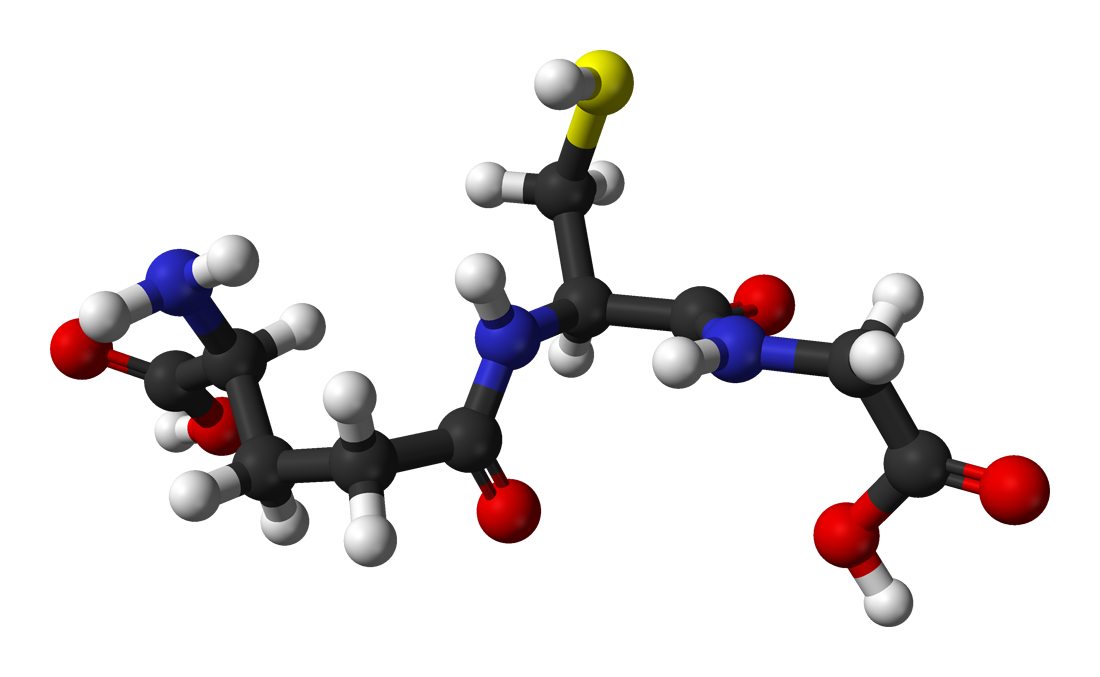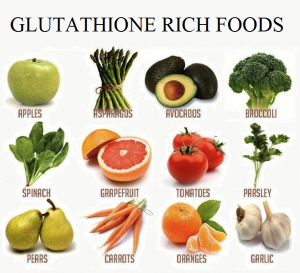

Coined “The Mother of all Antioxidants” and the “Master Cell Protector,” some say glutathione is the most important molecule in your body that you have never even heard of, so what is it and what does it do?
Discovered in 1888, Glutathione (GSH) is an important antioxidant in plants, animals, fungi, and some bacteria; in humans it is produced naturally by the liver. GSH is capable of preventing damage to important cellular components caused by reactive oxygen species such as free radicals, peroxides, lipid peroxides and heavy metals. The key to the success of this small powerhouse molecule are the sulphur groups it contains. Sulphur is a sticky molecule which acts like a magnet to numerous harmful substances in the body such as cancer-causing free radicals and toxins such as mercury and other heavy metals causing them to collect in the colon and be excreted as human waste.
Glutathione can be synthesized in the liver from amino acids L-cysteine, L-glutamic acid and glycine however some people may not be capable of producing enough GSH. Poor diet, pollution, toxins, medications, stress, trauma, aging, infections and radiation all deplete your glutathione levels. When GSH levels decrease, this is when the body becomes susceptible to disease.
Normally glutathione is recycled in the body but when the toxic load becomes too great, we lose this capability. There are various genes involved in GSH metabolism; they assist in producing enzymes that allow the body to create and recycle glutathione in the body. Through the evolutionary process, these genes have become impaired because we evolved prior to the mass amount of environmental toxicity we are bombarded with on a daily basis. Early humans survived with the basic version of the genetic detoxification software encoded in our DNA because we just didn’t need anything more aggressive.
Fast forward a few thousand years and not only is our diet lacking in vital cruciferous vegetables rich in glutathione but our water, the plants around us and even the air we breath are all attacking our bodies with toxins which we haven’t got the ability to fight.
Glutathione is critical to the body for numerous reasons;
There are more than 90,000 medical articles about the importance of maintaining high levels of glutathione ranging from its importance to the immune system and fighting heart disease to its vital role in the battle against Cancer and AIDS. GSH has exceptionally strong antiviral effects.
High levels of GSH in the body and subsequently in tissues and blood serum have been shown to inhibit and prevent the replication of virtually all pathogens.
A quick journey round the body will reveal just how crucial GSH is to every cell.
Brain – As well as decreasing oxidative stress in the brain, glutathione has also been shown to improve mental clarity and memory, as well as helping prevent the formation of amyloid plaques.
Cellular detoxification – Glutathione is the cell’s primary defence against chemicals and toxins, working to eliminate these from our bodies.
Eye health – GSH content in the eye is high as it works to protect the eye from harmful UV rays. Other glutathione benefits in the eye include assisting in the prevention of cataracts, glaucoma, retinal disease and diabetic blindness.
Fertility – At conception, the sperm and egg fuse due to the presence of glutathione. Research has indicated that increasing the levels of glutathione could improve fertility, particularly in males.
Immune system protection – The immune system works best if the lymphoid cells have properly balanced glutathione.
Lungs – The epithelial cells lining of the lungs utilise GSH to protect against oxidative stress.
Interestingly, glutathione is allegedly very popular amongst the Hollywood elite. The reason is the apparent power of GSH to lighten and brighten the skin. It is reported that glutathione helps to prevent the enzymatic pathways from producing melanin, the pigment that gives our skin its colour. Melanin is produced by the activation of the enzyme Tyrosinase. Glutathione binds to Tyrosinase and also prevents the activation of the enzyme by reducing free radicals in the body that can activate it therefore causing a decrease in melanin production. It is common for glutathione and Vitamin C to be taken in tandem for skin purposes due to the powerful antioxidant properties of both and the added support to collagen that Vitamin C provides.

If you were to go 24 hours without food, your liver would steal amino acids from the protein in your muscles to make this critical compound. If you are not producing enough GSH or eating the foods which are rich in this vital antioxidant then food supplementation is absolutely necessary.
Accepting payments via


YourHealthBasket © 2025
detoxpeople Ltd
Registered in England & Wales 07156741
VAT reg GB 103 3641 60
Our new practitioner portal has been released and it’s now easier than ever to link a client’s account and provide them with suggestions using our new protocol system.
Convert your current cart into a protocol which can then be assigned to a linked client.